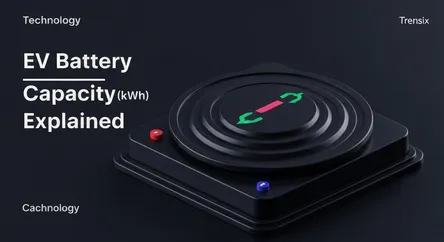Technology
EV Battery Capacity (kWh) Explained

Discover what kilowatt-hours (kWh) mean for electric vehicle battery capacity and how it directly impacts an EV's driving range and charging time.
What is it?
Battery capacity, measured in kilowatt-hours (kWh), is the automotive equivalent of a fuel tank's size for an electric vehicle (EV). It represents the total amount of energy a car's battery pack can store. A kilowatt-hour is a unit of energy, signifying one kilowatt of power sustained for one hour. For instance, an EV with a 75 kWh battery can theoretically deliver 75 kilowatts of power for one hour continuously. Simply put, a higher kWh number means the battery can hold more energy, which is a primary factor in determining the vehicle's potential driving range on a single charge.
Why is it trending?
As the global auto industry pivots towards electrification, battery capacity has become a headline specification. Consumers and critics alike use kWh as a key metric to compare different EV models, similar to how horsepower or miles-per-gallon were used for traditional cars. The trend is fueled by rapid advancements in battery technology, leading to higher-capacity batteries that conquer 'range anxiety'—the fear of running out of power. Automakers are in a competitive race to offer higher kWh ratings to attract buyers, making it a central topic in EV marketing and reviews.
How does it affect people?
For consumers, a battery's kWh rating directly influences the EV ownership experience. A larger capacity generally means a longer driving range, allowing for more travel between charges and making EVs viable for a wider audience. However, it also impacts the vehicle's price, weight, and charging time; larger batteries are more expensive and can take longer to replenish. Understanding kWh helps buyers make informed decisions, balancing their daily commuting needs, long-distance travel habits, and budget against the vehicle's range and performance capabilities, ultimately shaping their transition to electric mobility.